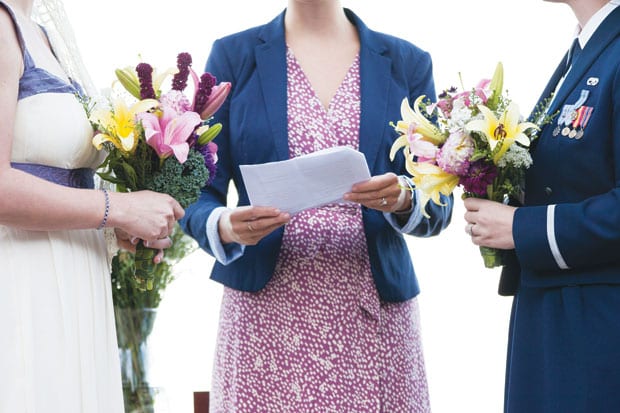University officials may be following state law, but Lambda Legal says federal law requires that the spouse receive the discounted tuition rate

PRIVATE CLASS | To protect her wife, the spouse of an Air Force captain wanted her name withheld and sent the above photo of themselves at their wedding as-is. (Courtesy photo)
SAN ANTONIO — The University of Texas at San Antonio is refusing to give in-state tuition to the spouse of a local military officer.
The spouse, who asked that her name be withheld because of her wife’s position, said her wife is a captain in the Air Force and they’ve lived in Texas since June. That’s not long enough of a residency to receive in-state tuition, but state and federal law have provisions that all military personal, spouses and dependents can receive in-state tuition.
But when the spouse applied, she received word on Sept. 27 that her in-state tuition had been denied per UTSA’s legal department. Her quest for a reason has gotten her nowhere with university officials.
“They had no precedent for accepting a same-sex spouse under in-state tuition and they’ve never denied a spouse of any other variety,” she said.
“Basically, nobody really knows why the decision was made. It was just made by a rogue guy in the legal department or it was a UT System decision.”
UTSA spokesman Joe Izbrand said the situation is a “complex issue that deserves thoughtful deliberation and it is still under review.”
“UTSA is proud to be nationally recognized as a military friendly university,” Izbrand said in an emailed statement to Dallas Voice. “We are equally as proud to be a university whose core values include inclusiveness and respect. We are committed to providing a diverse and positive environment in which all of our students, faculty and staff can thrive.”
The spouse was told this week that UTSA didn’t make the decision. Instead, it came from The University of Texas System.
UT System spokeswoman Karen Adler said the decision was “issued at the campus level, not by the UT System.” When asked if the system has a policy for same-sex spouses of military personnel, she said it didn’t have one.
Paul Castillo, staff attorney at Lambda Legal’s Dallas office, said he’s aware of the situation but isn’t sure what the university’s reason was behind its decision.
“At this point, we’re taking information and validating what’s going on before we make any commitment [to take the case],” he said.
Texas has a state law that provides a military waiver for service members and their families to receive in-state tuition under the Texas Education Code. But the state doesn’t recognize same-sex marriage.
But under the federal Higher Education Opportunity Act, all public institutions that receive federal funds from the U.S. Department of Education must provide in-state tuition to members of the armed forces and their spouses. With the federal government now recognizing same-sex marriage after the Defense of Marriage was struck down by the U.S. Supreme Court in June, Castillo said the university must give the spouse in-state tuition.
“The act was intended to ensure members of the armed forces and their families do not lose any educational opportunity when they’re called to active duty,” Castillo said. “Under the federal law, as long as the spouse is active for a least 30 days, the member and spouse are entitled to the in-state tuition.”
The spouse’s wife has been active in the Air Force for 13 years. The two were married last year in Washington. Since same-sex marriage wasn’t legal in the state then, the two returned in July to legally tie the knot.
Castillo said he’s not sure whether university officials went by state law to deny the spouse the tuition rate and were unaware of the federal provision, or if officials didn’t honor the federal requirement. He said it’s possible federal officials could handle the situation.
“It’s quite likely that this could come to the attention of the U.S. Department of Education,” Castillo said.
The spouse also attends San Antonio College for undergraduate nursing courses. When she submitted the paperwork for in-state tuition a month ago, she said officials didn’t look twice at her form.
“They gave it to me,” she said. “They didn’t even blink an eye. They just took the form, signed it and that was it.”
While the spouse is only taking one class at UTSA toward a Ph.D. in medical anthropology, with a difference in tuition rates of about $3,400 to $1,200, she said she’s fighting the denial of in-state tuition based on principle.
“I’m only really raising a fuss because it’s the principle of the matter,” she said. “It seems like it’s going to set precedent so other people don’t have the same issue.”
This article appeared in the Dallas Voice print edition October 4, 2013.

